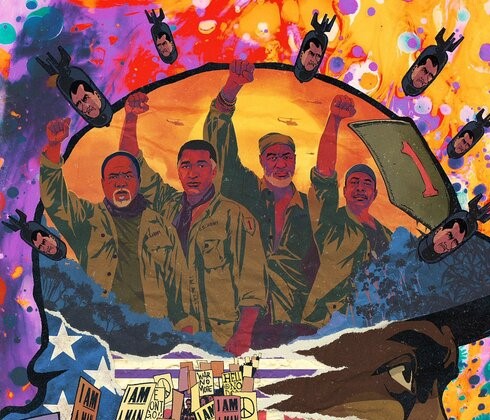Spike Lee didn’t find major award gold in 2020. But his provocative drama Da 5 Bloods, streaming on Netflix, is a movie for the times. While not a stand-out film, Lee’s telling of this story holds a gripping poignance in the wake of the Summer of 2020. Indeed, moments such as these are often where Spike Lee’s relevance shines.
Da Five Bloods as Social Commentary
Most importantly, Da 5 Bloods is a good movie. It’s also quintessential Spike Lee: hard nosed, uncompromising social commentary on justice and race in America.
This time, Lee uses the experiences of four black Vietnam War combat veterans as a lens through which he can comment on the African American experience and the Vietnam War. As such it provides a provocative (for mainstream audiences) glimpse into the worldview of what some call the African American “diaspora” – black Americans who do not identify with, or consider themselves part of, mainstream American culture.
The four fictional central characters served together during the Vietnam War. Their squad was led by Sgt. “Stormin’ Norman” Holloway, a revered leader played by Chadwick Boseman (in one of his last roles before passing away due to cancer). The squad was ferrying a load of gold as payment to Vietnamese guerillas when their helicopter was shot down. Holloway was killed in the resulting firefight. Paul (Delroy Lindo), Otis (Clarke Peters), Eddie (Norm Lewis) and Melvin (Isiah Whitlock, Jr.) survive. They return to present day Vietnam in an attempt to recover the gold. They are joined by Paul’s son. David (Jonathan Majors).
The quest to recover the buried, secret treasure soon takes unexpected twists and turns. But the story centers on the relationship between the men as they recount and relive their experiences in the jungle. Each man charted a different path after the war. Lee uses these stories to strengthen and challenge the bonds of camaraderie and friendship as they reconnect with their past, recover long buried memories, and struggle to reconcile their quest with the realities of modern-day Vietnam.
War and the African-American Diaspora Worldview
Spike Lee continues to be one of the industry’s most innovative filmmakers. Throughout the film, he mixes styles and viewpoints, at times speaking directly to the audience. At other times he provides a third person window into characters and the disheartening outcomes of their lived experiences.
Lee’s story is carefully sculpted to meditate on America’s cultural legacy of denying Black Americans the rights and privileges of mainstream America despite their sacrifice to serve America’s national interests. As Vietnam-era black paratrooper Robert Sanders wrote of his experience: “Black people were fighting with honor in Vietnam just like they did in other American wars…. [but] we felt they put us on the front lines abroad and in the back lines at home.” (Quoted in Robert Weisbrot, Freedom Bound: A History of America’s Civil Rights Movement, p. 251.)
Unfortunately, this cynical view is well grounded in history: The stunning retrogression into Jim Crow after the end of Reconstruction in 1876; re-segregation of federal employment under progressive president Woodrow Wilson; the reneging on Veteran’s benefits after World War I; the Memorial Day weekend burning of Black Wall Street during the Tulsa race riot of 1920; the denial of GI Bill benefits to African American veterans after World War II; overrepresentation among combat troops in Vietnam.
The historical links are hard to uncouple. A story about alienated African American veterans attempting to recover lost gold is a strong cultural metaphor.
Da 5 Bloods and the Outsider Perspective
Da 5 Bloods’ story and narrative is clearly targeted toward an audience receptive or connected to the black experience in America. As such, it provides a deep-seated window into the world view of at least some who consider themselves part of the African American Diaspora. This outsider perspective is central to the interpersonal dynamics of the story.
Lee also uses this perspective to reflect on a critical group of disenfranchised veterans. These men fought for a nation who refused to recognize their struggles and a government who used them as mercenaries on its battlefields.
Da 5 Bloods is a well scripted and executed film. Lee’s reworking of the original script to reflect the African-American experience in the war is itself testimony to his talent as a storyteller. As a director, his craftsmanship is reflected in the uniformly good acting and creation of relatable characters to mainstream audiences despite the narrowness of the story’s focus.
